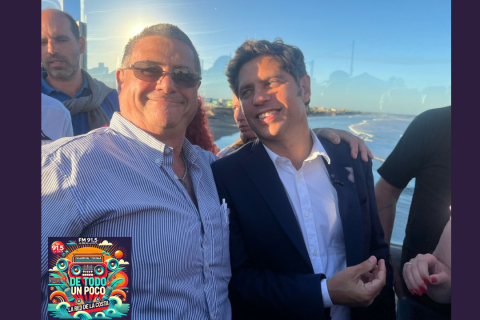RUBEN DANIEL
PARCERIA ARGENTINA

From the Healed Femur to a Conscious Future: Humanity's Evolutionary Journey
When renowned anthropologist Margaret Mead was asked what she considered the first sign of civilization in an ancient culture, her answer was striking in its depth: a broken and later healed femur. In the animal world, such a fracture is usually a death sentence. But if it healed, it was because someone cared for that person. For Mead, that act of compassion marked the beginning of civilization.
That same logic — based on cooperation, empathy, and mutual care — is what has allowed humanity to evolve beyond mere survival. Culture, and especially music, has been one of the most significant traces of that progress. From the first rhythmic sounds carved into bones to today’s complex symphonies, music has served as a way to express emotions, transmit knowledge, strengthen identity, and build collective bonds. It is a mirror of our sensitivity, our ability to dream, to remember, and to create meaning in community.
A Turning Point in History
Today, in the 21st century, humanity stands at a pivotal moment. Technological advances such as artificial intelligence, biotechnology, and space exploration have expanded our capabilities to unimaginable levels. However, these developments coexist with deep crises: climate change, wars, extreme inequality, and biodiversity loss.
Humanity now has the tools to solve many of these problems but also faces the risk of collapse if those tools are not used with awareness and responsibility. We are facing a collective choice: we can move toward a more just and sustainable civilization, or repeat the mistakes of the past and face irreversible consequences.
The Two Wolves Within Us
An old Cherokee parable summarizes the inner battle within every human being: inside each of us live two wolves — one filled with fear, hatred, and selfishness; the other with love, peace, and compassion. Which one wins? The one we feed.
This internal conflict is also reflected on a global scale. As a species, we must decide which values we are going to cultivate: those that led us to destroy, or those that can help us heal.
Evolution Requires a New Paradigm
For centuries, human history has been marked by the logic of the strongest. But the future will demand the survival of the most conscious, the most empathetic, the most connected to the common good. This cannot be achieved by technology alone, but through a cultural and spiritual transformation.
It is no longer enough to compete or merely survive. It is urgent to elevate sensitivity, develop empathy, and commit to creative cooperation. Civilizations that failed to change collapsed — and we still have time.
Love as the Engine of Evolution
Cultivating love in its highest sense — as active compassion, respect, and shared responsibility — may be the most revolutionary act of our time. This kind of love is not weakness; it is transformative power. It can humanize politics, dignify the economy, redefine technology, and give meaning to culture.
If we manage to place this love at the center of our decisions and relationships, we can reverse centuries of disconnection and create a new civilization — more human, more conscious, more alive.
Conclusion: The Future Is a Collective Choice
Human history has been a long journey from the instinct to survive toward the search for meaning. Today, we have the opportunity to take an evolutionary leap that is not just technical, but deeply human. The 21st century is not simply a passage — it is a decision.
We can choose to feed the wolf of fear or the wolf of love. We can repeat the mistakes of the past or build a future where civilization flourishes from its noblest root: the ability to care for one another and live in harmony with life.
Comentários (0)